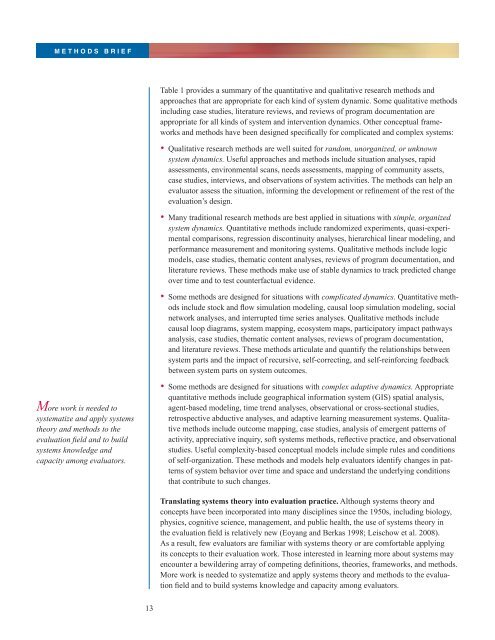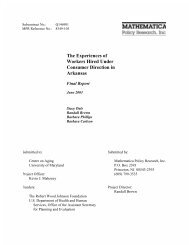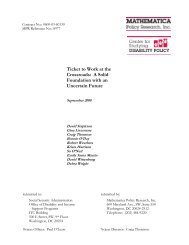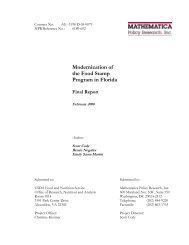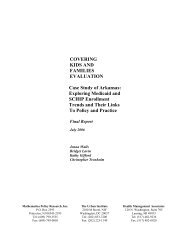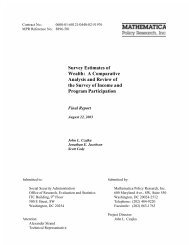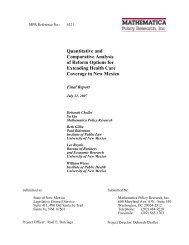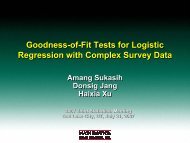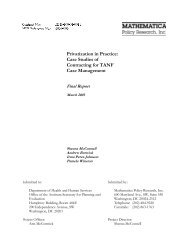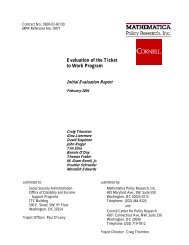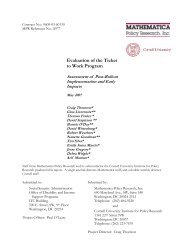Evaluating System Change - Mathematica Policy Research
Evaluating System Change - Mathematica Policy Research
Evaluating System Change - Mathematica Policy Research
Create successful ePaper yourself
Turn your PDF publications into a flip-book with our unique Google optimized e-Paper software.
M E T H O D S B R I E F<br />
More work is needed to<br />
systematize and apply systems<br />
theory and methods to the<br />
evaluation field and to build<br />
systems knowledge and<br />
capacity among evaluators.<br />
13<br />
Table 1 provides a summary of the quantitative and qualitative research methods and<br />
approaches that are appropriate for each kind of system dynamic. Some qualitative methods<br />
including case studies, literature reviews, and reviews of program documentation are<br />
appropriate for all kinds of system and intervention dynamics. Other conceptual frameworks<br />
and methods have been designed specifically for complicated and complex systems:<br />
• Qualitative research methods are well suited for random, unorganized, or unknown<br />
system dynamics. Useful approaches and methods include situation analyses, rapid<br />
assessments, environmental scans, needs assessments, mapping of community assets,<br />
case studies, interviews, and observations of system activities. The methods can help an<br />
evaluator assess the situation, informing the development or refinement of the rest of the<br />
evaluation’s design.<br />
• Many traditional research methods are best applied in situations with simple, organized<br />
system dynamics. Quantitative methods include randomized experiments, quasi-experimental<br />
comparisons, regression discontinuity analyses, hierarchical linear modeling, and<br />
performance measurement and monitoring systems. Qualitative methods include logic<br />
models, case studies, thematic content analyses, reviews of program documentation, and<br />
literature reviews. These methods make use of stable dynamics to track predicted change<br />
over time and to test counterfactual evidence.<br />
• Some methods are designed for situations with complicated dynamics. Quantitative methods<br />
include stock and flow simulation modeling, causal loop simulation modeling, social<br />
network analyses, and interrupted time series analyses. Qualitative methods include<br />
causal loop diagrams, system mapping, ecosystem maps, participatory impact pathways<br />
analysis, case studies, thematic content analyses, reviews of program documentation,<br />
and literature reviews. These methods articulate and quantify the relationships between<br />
system parts and the impact of recursive, self-correcting, and self-reinforcing feedback<br />
between system parts on system outcomes.<br />
• Some methods are designed for situations with complex adaptive dynamics. Appropriate<br />
quantitative methods include geographical information system (GIS) spatial analysis,<br />
agent-based modeling, time trend analyses, observational or cross-sectional studies,<br />
retrospective abductive analyses, and adaptive learning measurement systems. Qualitative<br />
methods include outcome mapping, case studies, analysis of emergent patterns of<br />
activity, appreciative inquiry, soft systems methods, reflective practice, and observational<br />
studies. Useful complexity-based conceptual models include simple rules and conditions<br />
of self-organization. These methods and models help evaluators identify changes in patterns<br />
of system behavior over time and space and understand the underlying conditions<br />
that contribute to such changes.<br />
Translating systems theory into evaluation practice. Although systems theory and<br />
concepts have been incorporated into many disciplines since the 1950s, including biology,<br />
physics, cognitive science, management, and public health, the use of systems theory in<br />
the evaluation field is relatively new (Eoyang and Berkas 1998; Leischow et al. 2008).<br />
As a result, few evaluators are familiar with systems theory or are comfortable applying<br />
its concepts to their evaluation work. Those interested in learning more about systems may<br />
encounter a bewildering array of competing definitions, theories, frameworks, and methods.<br />
More work is needed to systematize and apply systems theory and methods to the evaluation<br />
field and to build systems knowledge and capacity among evaluators.


